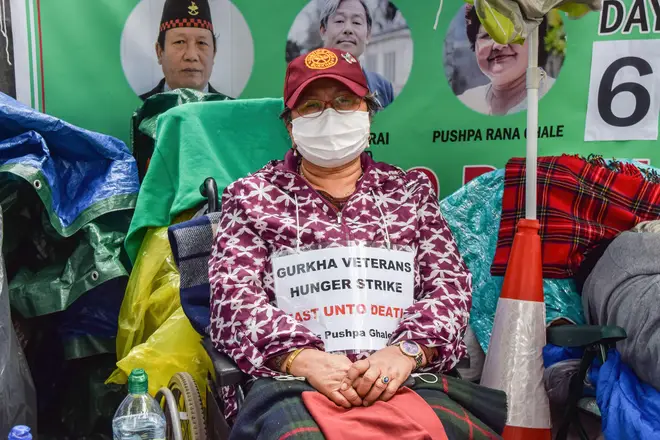
Clive Bull 1am - 4am
13 August 2021, 08:57

Will you support the Gurkhas on hunger strike, Defence Secretary?
Defence Secretary Ben Wallace told LBC this morning that he supports the Gurkhas but that retrospective pension changes "is never something we've ever done".
Gurkhas, Nepalese-born soldiers who have been recruited into the British army since 1815, were part of a separate pension scheme to the rest of the British armed forces until 2007. Some of those who retired prior to the end of this scheme ending are calling for changes to bring their pensions in line with the rest of the British army.
Speaking with Nick Ferrari this morning, Mr Wallace said that although he supports the Gurkhas, retrospective changes to pensions "is never something we’ve ever done in any government."
He stated: "I will happily go and meet them", although he acknowledged that this may not happen.
Mr Wallace said: "They are incredibly brave, we do support them."

Three Gurkha veterans are currently on hunger strike outside Downing Street, demanding parity with British soldiers over their pensions.
They say that they will strike "unto death". The protest is currently in its seventh day.
READ MORE: 'Britain is bullying us': Gurkha hunger strike protest enters fifth day
READ MORE: 'Why remove Gurkhas tent but allow XR to put a boat in Oxford Circus?'
Mr Wallace explained that changes to existing pension schemes made under Labour governments in the early 2000s meant that all then-serving Gurkhas and those who had retired since 1997 received an equal pension to British soldiers.
Prior to this Gurkhas received a lower pension than British soldiers on a scheme established in 1947 that was designed for those who returned to Nepal, due to the country’s lower cost of living.
He told Nick that his father fought the Gurkhas in the 1950s and he does not need "lectures from people who have never been in uniform, mainly the Labour party, telling me that somehow I don’t care for the Gurkhas".
READ MORE: Afghan translators 'risked their lives to help us stay alive' they 'earned place in UK'
Mr Wallace emphasised that despite this monetary difference, "that community had a 15 year qualifying period for their pension as opposed to the British [who had] 22 years."
He also noted that the group took the government to court in 2003, but lost their case.
In 2016, the European Court of Human Rights ruled that the changes to pensions only for those who retired after 1997 was "objectively and reasonably justified".